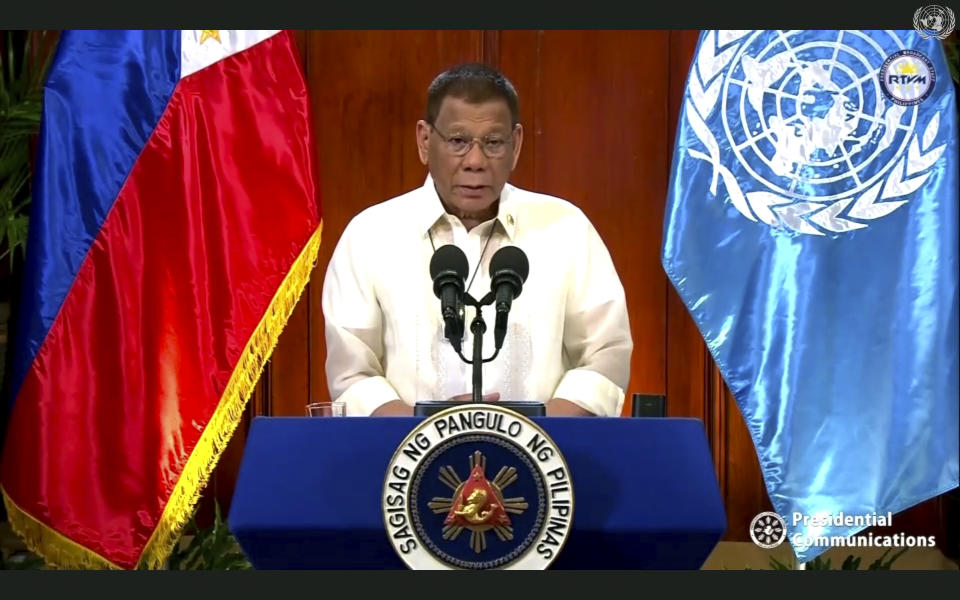South China Sea Watch: China holds drills amid new tensions
BEIJING (AP) — A look at developments in the South China Sea, where China is pitted against smaller neighbors in multiple territorial disputes over islands, coral reefs and lagoons. The waters are a major commercial shipping route and are rich in fish and possible oil and gas reserves.
___
CHINA HOLDS NEW DRILLS AMID UPTICK IN TENSIONS
China is holding new military exercises in the South China Sea amid an uptick in tensions between the Asian giant and its Southeast Asian neighbors and the U.S.
The Maritime Safety Administration issued a pair of announcements blocking off seas around the area of the exercises running Sunday through Monday but gave no additional details.
China holds regular drills in the area and there was no immediate indication they had been prompted by recent events.
However, they follow a series of sorties earlier this month by Chinese warplanes into Taiwan’s airspace at the northern end of the South China Sea. Beijing said those were intended as a warning to the self-governing island that China claims as its own territory to be brought under its control by force if deemed necessary.
Earlier this month, an Indonesian patrol ship confronted a Chinese coast guard vessel that spent almost three days in waters where Indonesia claims economic rights and are near the southernmost part of China’s disputed South China Sea claims.
The Philippines, Malaysia and Vietnam have also engaged in push-back against Chinese claims and actions in the area, while progress in talks between the Association of Southeast Asian Nations and China over the South China Sea appear at a standstill.
___
US CALLS CHINESE OUTPOSTS ‘PLATFORMS OF COERCION’
The U.S. State Department is accusing China of going back on its word to not militarize the Spratly Islands, calling Beijing’s outposts in the area “platforms of coercion.”
Spokesperson Morgan Ortagus recalled Chinese leader Xi Jinping’s statement during a White House visit in 2015 that “China does not intend to pursue militarization” of the Spratly Islands, and that China’s outposts would not “target or impact any country.”
“China has instead pursued a reckless and provocative militarization of those disputed outposts,” Ortagus said in a statement issued Sunday.
Ortagus cited China’s deployment of anti-ship cruise missiles, expanded surveillance capabilities, and the construction of runways and hangars for fighter jets. The Spratlys are occupied by multiple countries, making them the most hotly contested of the South China Sea's island groups.
China “uses these militarized outposts as platforms of coercion to assert control over waters to which Beijing has no lawful maritime claim, Ortagus said. “They serve as staging grounds for the hundreds of maritime militia vessels and China Coast Guard ships that regularly harass civilian craft and impede legitimate law enforcement activities, offshore fishing, and hydrocarbon development by neighboring states.”
China denies militarizing the region, saying the island developments are intended to increase maritime safety as well as assert Chinese territorial claims. It accuses the U.S. of militarizing the area by sailing its ships nearby Chinese outposts in “freedom of navigation operations” and through other actions.
___
PHILIPPINE PRESIDENT INVOKES 2016 RULING AGAINST CHINA
The Philippine president received rare praise from critics Wednesday for invoking before the United Nations a 2016 arbitration ruling that invalidated China’s vast territorial claims in the South China Sea.
President Rodrigo Duterte made one of his strongest defenses of the Philippine victory in the arbitration case in his first address before the annual U.N. General Assembly. China dismissed the conclusions of the Hague Tribunal and has long refused to bring the issue to any international arena.
Duterte, who has nurtured close ties with China since taking office in mid-2016, has long been criticized for refusing to immediately and forcefully demand Chinese compliance with the ruling. It found China’s claims on virtually the entire South China Sea on historical grounds inconsistent with international maritime law.
“The award is now part of international law, beyond compromise and beyond the reach of passing governments to dilute, diminish or abandon,” Duterte said, without naming China. “We firmly reject attempts to undermine it.”
Chinese officials did not immediately issue a reaction.
Albert del Rosario, a former Philippine foreign secretary who brought the disputes with China to international arbitration, said he was heartened by Duterte’s move.
Antonio Carpio, a retired Philippine Supreme Court justice who helped in the arbitration case, commended Duterte and hoped that “this is the policy that the Duterte administration will implement across all levels” in protecting Philippine maritime rights and seeking international support to enforce the ruling.
___
Associated Press writer Jim Gomez contributed to this report from Manila, Philippines.


